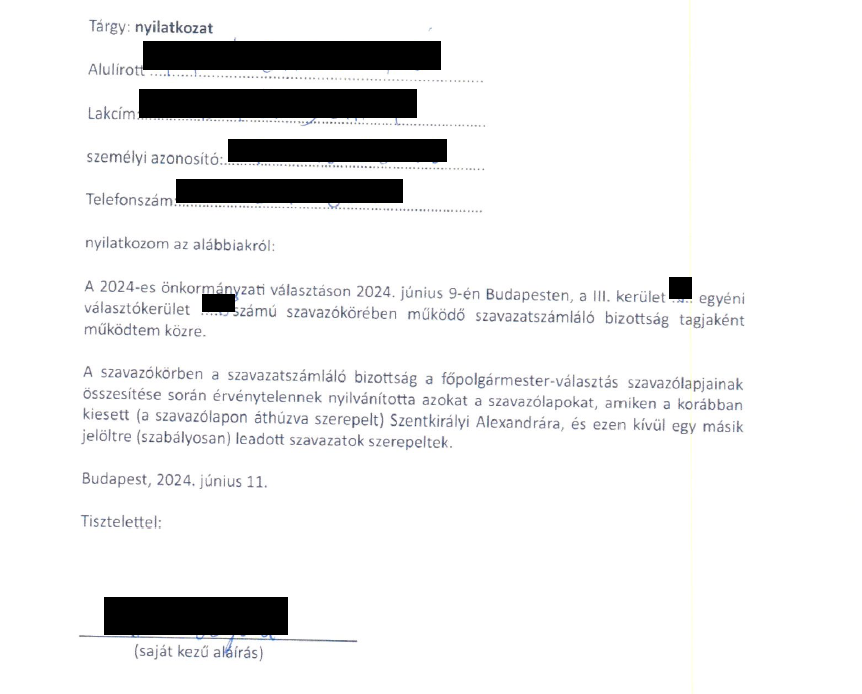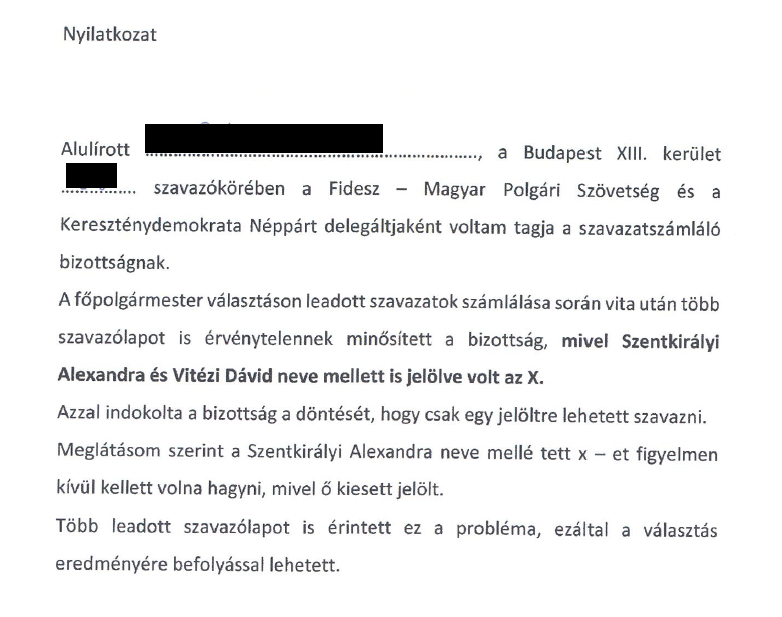The https://english.atlatszo.hu use cookies to track and profile customers such as action tags and pixel tracking on our website to assist our marketing. On our website we use technical, analytical, marketing and preference cookies. These are necessary for our site to work properly and to give us inforamation about how our site is used. See Cookies Policy
Recount of invalid votes in Budapest mayoral election decided by standardized form statements
According to documents obtained by Átlátszó, more than two hundred members of the electoral committees in Budapest declared ballots with votes for Dávid Vitézy and Alexandra Szentkirályi – whose name was crossed out – as invalid. And yet – a recount has been announced, which raises the risk of electoral fraud.
Some of Vitézy’s submissions lacked witnesses, and others were missing information about which party delegate declared that the invalidations were false. Despite the weak claims, the National Election Committee (NVB) accepted these declarations – most worded identically – as evidence for grounds for a recount.

The NVB announced the recount of the invalid votes after Wednesday’s meeting, citing “a large number of votes declared invalid which should be considered valid according to the provisions of the electoral law”. The decision was made with 12 votes in favor, and four against a recount.
Quick decision based on dubious statements
But the decision was made based on dubious declarations, which have been admitted as evidence by the NVB.
According to one anonymous NVB member who voted against it, the Committee received David Vitézy’s motion at the last minute, along with attached declarations from electoral committee members, almost all filled out with identical wording on a standardized form.
Due to the last-minute submission, voting members of the NVB did not have sufficient time to comb through the documents, which led to a rushed decision. Whether those who filled out the forms were members of the electoral committees – indeed, whether they even really existed – was never verified.
“Despite approving every invalidated ballot on the spot, the polling committee members now claim that they misunderstood one of the rules at the polling station. The Budapest Election Office sent out information about what to do in case complications like this should arise – if a vote was cast for Alexandra Szentkirályi, it was to be considered valid regardless of where the mark was placed. If there was an X next to another candidate as well, this is still a valid vote. And yet, despite the clear instructions, we are to believe that the electoral committee members misunderstood these rules, and yet no one raised any red flags on the spot. Should there be any inaccuracies found in Vitézy’s claims, they’ll have requested an electoral recount on false grounds.”
According to a legal expert consulted by Átlátszó, Vitézy and his team needed the statements because a recount can only be requested citing a legal violation. The text explicitly states that the parties involved acted illegally during the vote count. The NVB did not verify these statements at all even though some came openly from governing-party Fidesz delegates.
An opportunity for fraud
According to an anonymous election law expert, the issue isn’t necessarily the ordering of a recount, but rather the recount’s execution itself, which could expose the election to the significant danger of election fraud.
“The NVB decided that the vote did not require that the sealed ballot boxes were delivered and opened in front of delegates from all parties, as precedence would have dictated. Instead, they only requested the bundles of invalidated votes. This means that, from when the sealed boxes are opened to when the recount is completed, the ballot boxes and all the ballots will no longer be supervised by delegates from every party,” said the expert. This, they noted, would give anyone the opportunity to easily doctor the invalidated ballots.
A former member of the NVB expressed similar concerns to Átlátszó. “The process does not rule out or obstruct abuse in the vote count,” they said. “There is no policy about document handling with enforceable security guarantees. An average law firm has better safeguards. Data protection rules and other guarantees are ignored. There are no rules about who can guard or transport the ballots, nor is there any guarantee that unauthorized personnel won’t access the ballots. Loopholes persist – nothing, for example, suggests that the committee must have an opposition delegate present. If one is not present, the committee is unchecked, even during the count. The path of the ballots is untraceable. If someone reports abuse, the majority of the NVB easily vetoes.”
Translated by Vanda Mayer. The original, Hungarian version of this story was written by Tamás Bodoky and can be found here.
Cover photo: Election poster of Dávid Vitézy, candidate for mayor supported by LMP and the Association for Budapest with Dávid Vitézy, and Gergely Karácsony, candidate for mayor of the Párbeszéd-Greens-DK-MSZP on Váci út on 6 June 2024. Source: MTI/S Szilárd Koszticsák.
Share:
Your support matters. Your donation helps us to uncover the truth.
- PayPal
- Bank transfer
- Patreon
- Benevity
Support our work with a PayPal donation to the Átlátszónet Foundation! Thank you.
Support our work by bank transfer to the account of the Átlátszónet Foundation. Please add in the comments: “Donation”
Beneficiary: Átlátszónet Alapítvány, bank name and address: Raiffeisen Bank, H-1054 Budapest, Akadémia utca 6.
EUR: IBAN HU36 1201 1265 0142 5189 0040 0002
USD: IBAN HU36 1201 1265 0142 5189 0050 0009
HUF: IBAN HU78 1201 1265 0142 5189 0030 0005
SWIFT: UBRTHUHB
Be a follower on Patreon
Support us on Benevity!



